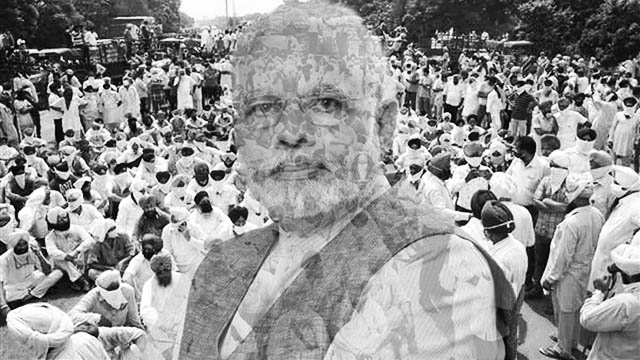During his 2014 general election campaign, Prime Minister Narendra Modi sold euphoria to cajole millions of Indians, nearly 160m, to vote for him and his Bharatiya Janata Party (BJP). One of his euphoric promises was freeing farmers from all sufferings. In his sixth year of unchallenged hegemony, Modi gifted the Indian farmers freedom, albeit to choose the lesser evil. The passage of two anti-farmer bills ––The Farmers’ Produce Trade and Commerce (Promotion and Facilitation) Bill, 2020 and The Farmers (Empowerment and Protection) Agreement of Price Assurance and Farm Services Bill, 2020––in both houses of the Parliament has pressed an eerie alarm and triggered farmers’ protests in Haryana and Punjab.
These two anti-farmer bills passed by the BJP using its brute majority in the Lok Sabha and through cunning tricks and secret support from a section of the opposition will end the control of the State governments’ Agriculture Produce Market Committee (APMC) over farm produce trade and open inter-state and intra-state trading of farm products by the unscrupulous feudal usurers. The end of APMC hegemony will make minimum support price a deception. Though the two anti-farmer bills are masked as “empowerment” agents for the farmers, it’s evident that the disorganised, underprivileged and mostly poor farmers can neither bargain with the organised and cunning corporate entities nor can they dictate their terms assertively.
Out of these two anti-farmer bills passed by the BJP, The Farmers (Empowerment and Protection) Agreement of Price Assurance and Farm Services Bill, 2020, gives teeth to the corporate houses to control the terms of any contract farming agreement, determine “quality” before farming and even facilitate the farm services, which include, apart from other factors, something as vague as “advice”. The farmers are liable of punishment under section 14 (2) (ii). Though section 15 provides immunity to their “agricultural land” from any “action for recovery”, it provides no guarantee that the farmer shall not have to sell their land to meet the cost of a penalty, which will be equal to the or less than the amount they have been paid by the corporates.
Though the Modi regime has been tom-toming about ending the role of intermediaries, the fact is that according to section 10 (ii) of The Farmers (Empowerment and Protection) Agreement of Price Assurance and Farm Services Bill, 2020, the role of an “aggregator”, ie, “an intermediary between a farmer or a group of farmers and a Sponsor” is defined. The Farmers’ Produce Trade and Commerce (Promotion and Facilitation) Bill, 2020, defines the role of an intermediary as a “trader” in section 2 (n) as someone “who buys farmers’ produce” for “self or on behalf of one or more persons”. The rebuttal of ending intermediaries’ role in the farm produce trade is, therefore, a sheer lie.
The BJP introduced three anti-farmer ordinances in June 2020, after Finance Minister Nirmala Sitharaman, under the much-hyped “Atmanirbhar Bharat” scheme, opened the gates of the farm sector to the corporates. Indian agriculture, which survived the pandemic and maintained a positive growth rate when the GDP crashed to -23.9% in the first quarter of the current financial year, became a lucrative vessel for the corporate world––globally suffering due to a severe financial crisis since 2009––to sail through the rough sea. This is a reason why the BJP unapologetically diluted provisions of the Essential Commodities Act, 1955, to provide leeway to its sponsors.
Now the question is, will the farmers give up? Can the common people who are exposed to an imminent food crisis and inflation remain quiet and nonchalant? Will the farmers outside Haryana and Punjab arise against these bills? Like the contentious citizenship matrix of Modi aroused a large number of people, these two anti-farmer bills, to be followed by the third one in the row, can also change Indian political course if the farmers throughout India are made aware of the threat posed by these legislations against them.
The intensity of the farmers’ movement throughout the country against these two anti-farmer bills of the Modi regime can thwart the attempts of the BJP to divide the poor into communally antagonistic camps. The genuine anti-fascist opponents of the BJP must not lose this opportunity and intensify the farmers’ movement against the corporate onslaught. Time is a luxury, and it should not be used in such a crucial period.
Editorial desk of People's Review provides you the editorial view point and also shares the outlook of the collective wisdom that manages the publication. Send letters to the editor at: Write2us@peoplesreview.in

